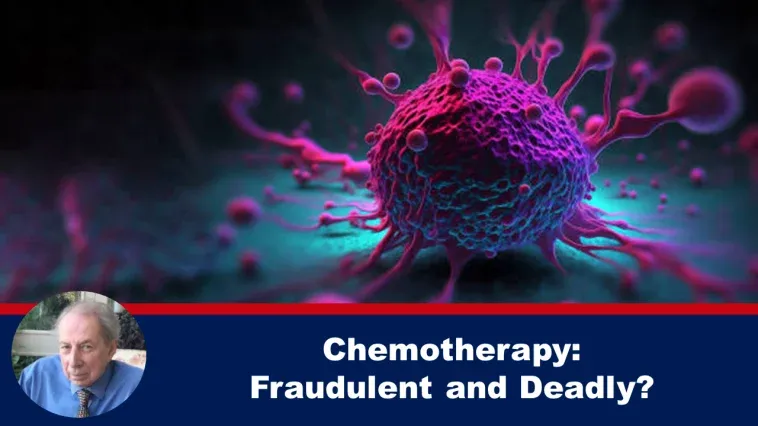(The Exposé) Patients who are diagnosed with cancer find themselves in a state of shock. And yet, while in a state of shock, they find themselves needing to make a number of vital decisions very quickly.
One of the big questions is often this one: “Should I have chemotherapy?”
Chemotherapy might improve a patient’s chances of survival by three to five per cent though that modest figure is usually over-generous. For example, the evidence suggests that chemotherapy offers breast cancer patients an uplift in survival of little more than 2.5%.
When you consider that chemotherapy can kill and does terrible damage to healthy cells, and to the immune system, it is difficult to see the value of taking chemotherapy.
I don’t think it is any exaggeration to suggest that much of the hype around chemotherapy has taken the treatment into the area of fraud – far more fraudulent indeed than treatments which are dismissed as irrelevant or harmful by the establishment.
Chemotherapy is a cull, designed by the conspirators and the medical establishment to cut the cost of caring for cancer patients.
The chances are that the doctors looking after you – especially the specialist oncologists in hospital – will recommend chemotherapy. They may push hard to accept their recommendation. They may even be cross or dismissive or assume you are ignorant or afraid if you decide you don’t want it. Cancer charities often shout excitedly about chemotherapy. But they are also often closely linked to the drug companies which make money out of chemotherapy – which in my view makes them part of the large and thriving “cancer industry.” It is important to remember that drug companies exist to make money and they will do whatever is necessary to further this aim. They lie and they cheat with scary regularity and they have no interest in helping patients or saving lives. Remember that: the sole purpose of drug companies is to make money, whatever the human cost might be. They will happily suppress potentially life-saving information if doing so increases their profits. It is my belief that by allying themselves with drug companies, cancer charities have become corrupt.
Little or no advice is given to patients about how they themselves might reduce the risk of their cancer returning. The implication is that it’s chemotherapy or nothing. So, for example, doctors are unlikely to tell breast cancer patients that they should avoid dairy foods, though the evidence that they should is very strong. The one certainty is that it is extremely unlikely that anyone you see will tell you all the truths about chemotherapy. The sad truth is that the statistics about chemotherapy are, of course, fiddled to boost drug company sales and, therefore, drug company profits. And the deaths caused by chemotherapy are often misreported or underestimated. So, for example, if a patient who has been taking chemotherapy dies of a sudden heart attack their death will probably be put down as a heart attack – rather than as a result of the cancer or the chemotherapy. There may be some mealy-mouthed suggestion that the death was treatment-related but the drug will probably not be named and shamed. Neither the chemotherapy nor the cancer will be deemed responsible. What this means in practice is that the survival statistics for chemotherapy are considerably worse than the figures which are made available – considerably worse, indeed, than whatever positive effect might be provided by a harmless placebo.
Here’s another thing: patients who have chemotherapy and survive five years are counted as having been cured by chemotherapy. And patients who have chemotherapy and then die five and a bit years after their diagnosis don’t count as cancer-related deaths. And they certainly don’t count as chemotherapy deaths.
A 2016 academic study looked at five-year survival rates and concluded that in 90% of patients (including the commonest breast cancer tumours), chemotherapy increased five-year survival by less than 2.5%. Only a very small number of cancers (such as testicular cancer and Hodgkin’s disease) were treated effectively by chemotherapy. On top of this dismal success rate, it must be remembered that chemotherapy cripples the immune system (now, at long last, recognised as important in the fight against cancer), damages all living cells, damages the intestines, can cause nausea and tinnitus, can damage nerves, can and does damage the bone marrow with the result that leukaemia develops,(staggeringly, iatrogenic myeloid leukaemia, usually known as “therapy-related” in an attempt to distance the disease from doctors, is, in ten per cent of cases, a result of chemotherapy), damages the heart and the hearing and will, in a significant number of patients, result in death.
It is true that chemotherapy may reduce the size of a tumour but in stage 4 cancer chemotherapy seems to encourage a cancer to return more quickly and more aggressively. The cancer stem cells seem to be untouched by the chemotherapy drugs.
Despite all this, the protocol in the treatment of cancer is to turn to chemotherapy and doctors are always reluctant to try anything else.
The Academy of Royal Medical Colleges, which represents 24 Royal Colleges, and a number of other important health bodies, has reported that chemotherapy can do more harm than good when prescribed as palliatives for terminally ill cancer patients. The colleges criticise chemotherapy advocates for “raising false hopes” and doing “more harm than good.” They concluded that chemotherapy drugs are unlikely to work.
On the other hand, I wasn’t surprised to see a big cancer charity disagreeing with the 24 medical colleges and claiming that thousands of patients do benefit. My view, which I recognise is probably not shared by the majority of family doctors or oncologists, is that many cancer charities around the world are the unacceptable face of cancer care. It seems to me to be more concerned with making money and keeping the drug companies rich than with caring for patients.
Another report has concluded that chemotherapy can, in some circumstances, actually promote the spread of cancer cells. It was reported in 2017, for example, that when breast cancer patients have chemotherapy before surgery the drug can make the malignant cells spread to distant sites – resulting in metastatic cancer and sending the patient straight from Stage 1 to Stage 4.
Scientists analysed tissue from 20 breast cancer patients who had 16 weeks of chemotherapy and the tissues around the tumour were more conducive to spread in most of the patients. In five of the patients, there was a five times greater risk of spread. In none of the patients was the tissue around the tumour less friendly to cancer cells and to metastasis. The problem, it seems is that cancer cells have a great ability to transform themselves and the chemotherapy, designed to kill cancer cells, may encourage the development of cells which are resistant to drugs, which survive the treatment and which form a new cancer.
The one side effect associated with chemotherapy that is widely known is the loss of hair. But that is, to be honest, the least of the problems. Chemotherapy kills healthy cells as well as cancer cells and the severity of the side effects depends on the age and health of the patient as well as on the type of drug used and the dosage in which it is prescribed. And whereas some side effects do disappear after treatment (as the good cells recover) there are some side effects which may never go away.
I mentioned the serious side effects a little earlier but here, as a reminder, is a list of just some of the problems that can be caused by chemotherapy drugs:
The cells in the bone marrow can be damaged, producing a shortage of red blood cells and possibly leukaemia.
The central nervous system can be damaged with a result that the memory may be affected and the patient’s ability to concentrate or think clearly changed. There may be changes to balance and coordination. These effects can last for years. Apart from affecting the brain, chemotherapy can also cause pain and tingling in the hands and feet, numbness, weakness and pain. Not surprisingly, depression is not uncommon.
The digestive system is commonly affected with sores forming in the mouth and throat. These may produce infection and may make food taste unpleasant. Nausea and vomiting may also occur. The weight loss associated with chemotherapy may be a result of a loss of appetite.
In addition to hair loss (which can affect hair all over the body), the skin may be irritated and nails may change colour and appearance.
The kidneys and bladder may be irritated and damaged. The result may be swollen ankles, feet and hands. Osteoporosis is a fairly common problem and increases the risk of bone fractures and breaks. Women who have breast cancer and who are having treatment to reduce their oestrogen levels are particularly at risk.
Chemotherapy can produce hormone changes with a wide variety of symptoms.
The heart may be damaged and patients who already have weak hearts may be made worse by chemotherapy.
And the other problem with chemotherapy is that it can damage the immune system.
And it is known that chemotherapy can damage DNA.
And does chemotherapy alter the nature of cancer cells? Can it, for example, trigger a change from an oestrogen-sensitive cancer cell to a triple negative cell – much harder to treat?
And then there is the risk that chemotherapy might spread cells around the body.
Finally, there is increasing evidence to show that chemotherapy may hasten the death of a number of patients.
Drug companies, cancer charities and doctors recommend chemotherapy because there is big money in it. The least forgivable of these are the cancer charities which exist to protect people but which are ruthless exploiters of patients.
As always, the medical literature is confusing but in the ‘Annuals of Oncology’ I found this: “The upfront use of chemotherapy does not seem to influence the overall outcome of the disease.”
Most doctors won’t tell you this, or even admit it to themselves, but cancer drugs are killing up to 50% of patients in some hospitals. A study by Public Health England and Cancer Research UK found that 2.4% of breast cancer patients die within a month of starting chemotherapy. The figures are even worse for patients with lung cancer where 8.4% of patients die within a month when treated with chemotherapy. When patients die that quickly, I feel that it is safe to assume that they were killed by the treatment, not the disease. At one hospital the death rate for patients with lung cancer treated with chemotherapy was reported at over 50%. Naturally, all the hospitals which took part in the study insisted that chemotherapy prescribing was being done safely. If we accept this then we must also question the validity of chemotherapy. The study showed that the figures are particularly bad for patients who are in poor general health when they start treatment.
Next, think about this.






